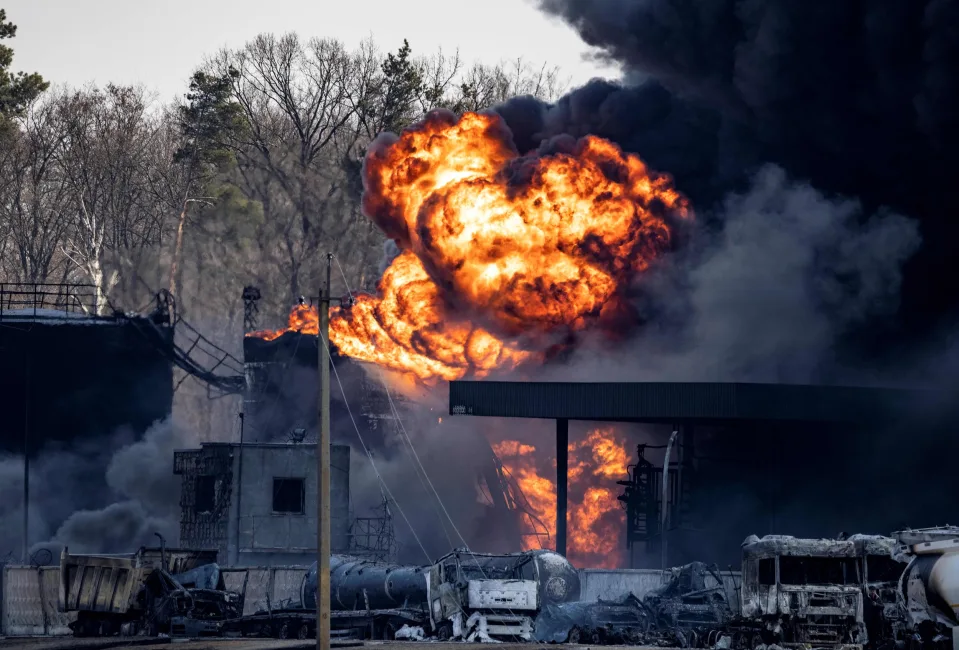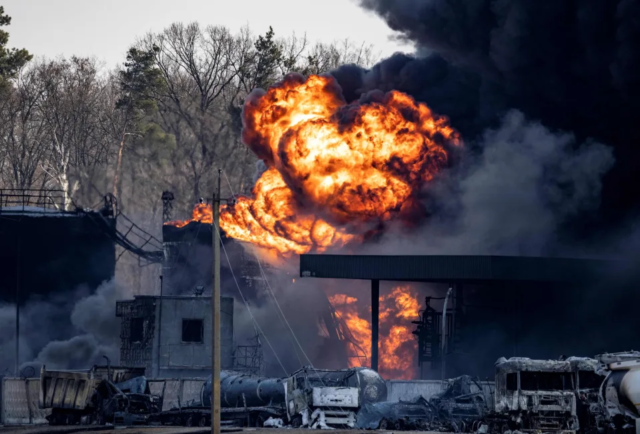
Amid the never-ending coverage of the latest offensive or counteroffensive in Ukraine, it is often unappreciated just how much worse the global economic repercussions from the conflict could have been. Russia is the world’s leading exporter of gas and provided around 50% of the EU’s demand before the war; Ukraine, meanwhile, is a major exporter of grain, alongside Russia itself. The complete disruption of either of these channels would have resulted in catastrophe.
The fact this didn’t happen last year was largely thanks to two crucial agreements secured early in the conflict: the Black Sea Grain Initiative, whereby Russia allowed Ukraine to continue exporting grain via the Black Sea (which is under its control), and a deal that allowed Russian gas to continue flowing to Europe via Ukraine. But the former has just been suspended, and the latter could soon be terminated. The true cost of this war, it seems, is about to greatly increase.
When the grain deal was brokered last July, António Guterres, the secretary-general of the UN, called it a “beacon of hope” — and rightly so. Reaching an agreement of this kind was a remarkable achievement and a big, if rare, victory for international diplomacy. It contributed to significantly lowering grain prices and avoided a collapse in Ukrainian exports (which only declined by around 30%) — effectively preventing a potential global humanitarian disaster. Over the past year, more than 1,000 ships (containing nearly 33 million metric tons of grain and other foodstuffs) left Ukraine from three Ukrainian ports: Odesa, Chornomorsk and Yuzhny/Pivdennyi.
On July 17, however, Putin pulled out of the deal. Russia’s move didn’t come out of the blue. As Western sanctions increased, the deal had started coming under growing strain, with the Kremlin claiming that the West wasn’t holding up its end of the bargain, which allowed for more Russian agricultural and fertiliser exports. For this to happen, Russia insisted on reconnecting the Russian Agricultural Bank to the Swift international payment system and, among other things, the unblocking of assets and accounts of those Russian companies involved in food and fertiliser exports.
But the most important demand was the resumption of the Togliatti-Odessa ammonia pipeline, which runs from the Russian city of Togliatti to various Black Sea ports in Ukraine, and which prior to the war exported 2.5 million tonnes of ammonia annually. As part of the negotiations over the Black Sea Grain Initiative, Kyiv and Moscow struck a deal to allow the safe passage of ammonia through the pipeline — but the latter was never reopened by Ukraine. Last September, the UN urged Ukraine to resume its transport, in view of ammonia fertiliser’s crucial role in supporting global agricultural productions, but to no avail.
Then, last month, Russia once again demanded once the reopening of the pipeline as a condition for renewing the Black Sea Grain Initiative. Just a few days later, a section of it located in Ukrainian territory was blown up — according to Russia, by Ukrainian saboteurs, in a deliberate effort to sabotage the grain deal. The governor of Ukraine’s Kharkiv Oblast, however, maintains that it was destroyed by Russian shelling. In any case, the fate of the deal was more or less sealed at that point: when Dmitry Peskov, Putin’s spokesman, announced a month later that “the Black Sea agreements are no longer in effect”, few were surprised. The decision came just a few hours after Ukraine’s strike on the bridge connecting mainland Russia to Crimea, though Moscow denied that there was a connection between the two events.
Predictably, the West has chastised Russia’s decision to pull out of the deal. US Secretary of State Antony Blinken said his country regrets Russia’s “continued weaponisation of food”, while the EU’s foreign policy chief Josep Borrell claimed that Putin is “using hunger as a weapon”. Elsewhere, Poland’s Foreign Minister Zbigniew Rau described it as “nothing less than an act of economic aggression against the states of the Global South, which are most dependent on the Ukrainian grain”, while Italian Prime Minister Giorgia Meloni stated that Russia’s decision is “further proof on who is a friend and who is the enemy of the poorest countries”.
Such strong rhetoric masks a more nuanced picture, however. As Oxfam has claimed, based on data from the UN’s Joint Coordination Centre, less than 3% of the grain from the deal went to the world’s poorest countries, including Ethiopia, Sudan, Somalia, Afghanistan and Yemen. By contrast, approximately 80% of the grain has been shipped to richer countries, mainly EU countries and China. Putin himself, in conversation with the President of South Africa Cyril Ramaphosa, claimed that “the deal’s main goal — to supply grain to countries in need, including those on the African continent — has not been implemented”.
Yet despite Putin’s claims of export challenges, Russia enjoyed record levels of wheat shipments over the past year — so clearly this decision has much more to do with the exacerbation of West-Russia relations than it has to do with strictly economic issues. Likewise, it is fair to assume that Putin’s decision to send free grain to six African countries that have strong ties with Moscow has more to do with strengthening global alliances than actual humanitarian concerns. But with no end to the war in sight, and all sides engaged in increasingly brazen military brinkmanship, is anyone really surprised that a deal that hinged entirely on Russia’s goodwill has come undone?
And the price will be paid by Western countries, too. Now that the Black Sea Grain Initiative has been paused, even greater quantities of Ukrainian grain will be transported overland across Europe through so-called “solidarity routes” set up by the EU. Yet problems had already arisen before the initiative collapsed, as cheap Ukrainian grain, much of which was exported by tax-avoiding shell firms, flooded local markets, where they undercut local produce and angered farmers. In response, in April, the governments of Poland, Bulgaria, Hungary, Romania and Slovakia introduced unilateral bans on Ukrainian grain until an EU deal was agreed that made it possible to reduce pressure on local markets, while at the same time enabling the transit of Ukrainian goods to traditional markets in non-EU countries. With the suspension of the Black Sea Grain Initiative, however, the pressures are likely to increase.
At the moment, the future of the deal remains unclear. Putin left the door open to reviving it, saying that Russia will comply “as soon as the Russian part (of the deal) is completed”. However, the fact that Russia has launched several attacks on critical grain export infrastructure in the Odesa region suggests that a resumption of the deal appears unlikely anytime soon.
And it appears a similar story of obstruction seems to be playing out with Russian gas exports. Despite the war, Russian gas has continued to flow through Ukraine into Europe — softening the blow of the EU’s intention of decoupling from Russian energy while allowing Ukraine to raise much-needed cash in the form of transit fees. In a recent interview with the Financial Times, however, German Galushchenko, Ukraine’s energy minister, said that Kyiv is unlikely to renew the gas transit deal when Ukraine’s supply contract with Gazprom expires in 2024.
In practice, this would mean the closure of one of the last arteries still carrying Russian gas to Europe, a move which would severely weaken many energy-dependent EU countries. Recent analysis by Columbia University’s Center on Global Energy Policy suggests that deliveries to EU countries “could drop to between 10 and 16 billion cubic meters (45 to 73% of current levels)”, according to a June analysis by Columbia University’s Center on Global Energy Policy, leaving Europe with a shortfall that cannot currently be replaced with greater liquefied natural gas imports from the US and Qatar.
Moreover, the loss of even a small percentage of supply has the potential to raise prices across the continent, given the tightness of global gas markets. In Germany, for instance, the economy minister has hinted that the country will be forced to significantly wind down its industrial activities if the gas agreement isn’t extended at the end of the year. For a country — and indeed a continent — already struggling with creeping deindustrialisation, the consequences could be devastating.
This is especially worrying if we consider that, barring the same higher-than-average temperatures as last year, this winter Europe will have a natural gas deficit of at least 60 billion cubic meters. In other words, it’s not inconceivable that another gas crisis is around the corner — and it might be even worse than last year’s. As the Ukraine war drags on, even the few safeguards put in place are coming undone. Instead of being diluted by diplomacy, the repercussions of this conflict have merely evolved.






